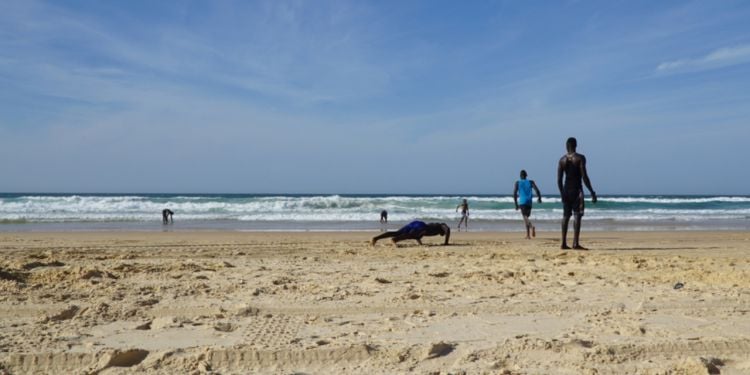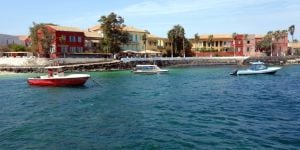
Dakar is not just Senegal’s capital city, but its economic, cultural and sporting hub. Situated on the Cap-Vert peninsula, it is almost entirely surrounded by the Atlantic ocean, which offers up a number of watersports, fishing opportunities and beaches, while Dakar also hosts a wide range of stadiums and sports clubs. In addition, there is an endless number of museums, art galleries and theatres for you to dip your cultural toe into.
Whether you're looking for something family-friendly or on your own, there is something for everyone, no matter your age or budget.
Sports in Dakar
Dakar is sports-mad. Every day after work, the streets and beaches become alive with Senegalese exercising - be it jogging, training, sparring or using one of the large outdoor gyms along the western Corniche road.
La lutte (Senegalese wrestling) is one of the most popular sports in the country, and local men will practice on beaches, while there are also gyms that specialise in a variety of martial arts across the city (from traditional boxing to jujitsu). The other popular sports in Senegal are football and basketball, and there are pitches and courts in every district - there are also leagues you can join. Besides, you can play tennis, paddle, rugby and pool, while the King Fahd hotel has a nine-hole golf course and Sea Plaza has a modern bowling alley. Yoga, pilates and dance classes can also be easily found.
However, Dakar is particularly known for its aquatic sports. Surfing in the northern parts of the peninsula is world-renowned with spots and waves for every type of surfer. In addition, you can go diving, fishing, swimming, bodyboarding and even try your hand at stand-up paddle.
Arts and culture in Dakar
Dakar is the West African capital of arts and culture. Every two years it hosts the Dakar Biennale, the largest contemporary art show in Africa which takes place in venues across the city. However, there is an active cultural scene all year round. Museums highlight west African history and heritage, with the largest being the Museum of Black Civilisations. Art galleries range from local workshops - like the Village des Artes - to established names and offer an eclectic mix of modern and traditional art from West Africa and its diaspora. Meanwhile, there is also theatre productions, dance performances and cinemas showing the latest films (mostly in French). The Institut Francais always has a diverse cultural offering, and there are lots of live music shows on the weekends.
If you want to be more hands-on, you can also try learning a language (e.g. Wolof, Spanish, French) by attending classes, try out a musical instrument or even don an apron and learn how to cook traditional Senegalese dishes, such as Thieboudienne and Mafé.
Markets in Dakar
Dakar also offers markets of all shapes and sizes. Spend a day buying fabric in HLM or fresh produce in Kermel, pick up some fish at Soumbedioune market or second-hand clothes in Colobane. No matter what you need or what type of market you prefer, you can find it in Dakar.
Island day-trips around Dakar
Nowadays, the city of Dakar does not solely consist of the mainland. In fact, there are three main islands off its coast, which are great for a day trip. In the north, Ile d'Ngor is a 5-minute pirogue ride away and offers crystal clear waters, sandy beaches, surfing and beach-side restaurants, while Ile de Madeleine is a nature reserve off the west of Dakar, which is home to many shorebirds and other wildlife. However, the most famous island is undoubtedly Ile Gorée. Founded in the 15th century, it was the first European settlement in the region and became a hub for exporting west African goods, including slaves. A visit to its pastel-coloured houses and cobbled streets, as well as the infamous Maison des Esclaves, is a must.
Useful links:
Au Senegal - Cultural and Sports agenda
Culture Trip
Institut Français
We do our best to provide accurate and up to date information. However, if you have noticed any inaccuracies in this article, please let us know in the comments section below.








